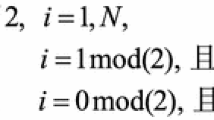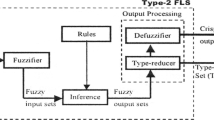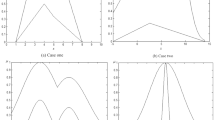Abstract
Since the alpha-planes expressions of general type-2 fuzzy sets (GT2 FSs) have been proposed, general type-2 fuzzy logic systems (GT2 FLSs) that are dependent on GT2 FSs are becoming quite popular to fuzzy logic researchers. Usually enhanced Karnik–Mendel (EKM) algorithms are adopted for performing the kernel block of type-reduction (TR). However, the essence of EKM-based TR process probably hinders the GT2 FLSs from real-world applications. It is an intriguing as well as unsolved problem for comparing EKM algorithms with other non-iterative algorithms. This paper provides a framework encompassing fuzzy reasoning, defuzzification, as well as type-reduction. Furthermore, the continuous of NT (CNT) algorithm is shown to be a precise approach when it is used to execute the centroid TR of GT2 fuzzy logic systems. Four computer tests display the characteristics of discrete Nagar-Bardini (NB) and Nie-Tan (NT) non-iterative algorithms. Compared with EKM approach, the developed one exhibits some superiorities in terms of guaranteeing high computation accuracy and low computation burdens, which broadens the application ranges for the proposed method.







Similar content being viewed by others
References
Khosravi, A., Nahavandi, S.: Load forecasting using interval type-2 fuzzy logic systems: optimal type reduction. IEEE Trans. Industr. Inf. 10(2), 1055–1063 (2014)
Chen, Y., Wang, D.Z., Tong, S.C.: Forecasting studies by designing Mamdani interval type-2 fuzzy logic systems: with combination of BP algorithms and KM algorithms. Neurocomputing 174, 1133–1146 (2016)
Melin, P., Astudillo, L., Castillo, O., Valdez, F., Garcia, M.: Optimal design of type-2 and type-1 fuzzy tracking controllers for autonomous mobile robots under perturbed torques using a new chemical optimization paradigm. Expert Syst. Appl. 40(8), 3185–3195 (2013)
Barkat, S., Tlemcani, A., Nouri, H.: Noninteracting adaptive control of PMSM using interval type-2 fuzzy logic systems. IEEE Trans. Fuzzy Syst. 19(5), 925–936 (2011)
Wang, D.Z., Chen, Y.: Study on permanent magnetic drive forecasting by designing Takagi Sugeno Kang type interval type-2 fuzzy logic systems. Trans. Inst. Measure. Control 40(6), 2011–2023 (2018)
Bernardo, D., Hagras, H., Tsang, E.: A genetic type-2 fuzzy logic based system for the generation of summarized linguistic predictive models for financial applications. Soft. Comput. 17(12), 2185–2201 (2013)
Lee, C.S., Wang, M.H., Hagras, H.: Type-2 fuzzy ontology and its application to personal diabetic-diet recommendation. IEEE Trans. Fuzzy Syst. 18(2), 316–328 (2010)
Méndez, G.M., Hernández, M.D.L.A.: Hybrid learning mechanism for interval A2–C1 type-2 non-singleton Takagi-Sugeno-Kang fuzzy logic systems. Inf. Sci. 220(1), 149–169 (2013)
Mendoza, O., Melin, P., Castillo, O.: Interval type-2 fuzzy logic and modular networks for face recognition applications. Appl. Soft Comput. 9(4), 1377–1387 (2009)
Niewiadomski, A.: On finity, countability, cardinalities, and cylindric extensions of type-2 fuzzy sets in linguistic summarization of databases. IEEE Trans. Fuzzy Syst. 18(3), 532–545 (2010)
Wu, D.R., Mendel, J.M.: Uncertainty measures for interval type-2 fuzzy sets. Inf. Sci. 177(23), 5378–5393 (2007)
Mendel, J.M.: Alpha-plane representation for type-2 fuzzy sets: theory and applications. IEEE Trans. Fuzzy Syst. 17(5), 1189–1207 (2009)
Mendel, J.M.: General type-2 fuzzy logic systems made simple: a tutorial. IEEE Trans. Fuzzy Syst. 22(5), 1162–1182 (2014)
Mendel, J.M.: On KM algorithms for solving type-2 fuzzy set problems. IEEE Trans. Fuzzy Syst. 21(3), 426–446 (2013)
Mendel, J.M., Liu, F.L.: Super-exponential convergence of the Karnik-Mendel algorithms for computing the centroid of an interval type-2 fuzzy set. IEEE Trans. Fuzzy Syst. 15(2), 309–320 (2007)
Wu, D.R., Mendel, J.M.: Enhanced Karnik-Mendel algorithms. IEEE Trans. Fuzzy Syst. 17(4), 923–934 (2009)
EI-Nagar, A.M., EI-Bardini, M.: Simplified interval type-2 fuzzy logic system based on new type-reduction. J. Intellig. Fuzzy Syst. 27(4), 1999–2010 (2014)
Li, J.W., John, R., Coupland, S., Kendall, G.: On Nie-Tan operator and type-reduction of interval type-2 fuzzy sets. IEEE Trans. Fuzzy Syst. 26(2), 1036–1039 (2018)
Biglarbegian, M., Melek, W.W., Mendel, J.M.: On the robustness of type-1 and interval type-2 fuzzy logic systems in modeling. Inf. Sci. 181(7), 1325–1347 (2011)
Y. Chen. Study on centroid type-reduction of interval type-2 fuzzy logic systems based on noniterative algorithms. Complexity: Volume 2019. Article ID 7325053, 1–12 (2019)
Liu, F.L.: An efficient centroid type-reduction strategy for general type-2 fuzzy logic system. Inf. Sci. 178(9), 2224–2236 (2008)
Chen, Y., Wang, D.Z.: Forecasting by designing Mamdani general type-2 fuzzy logic systems optimized with quantum particle swarm optimization algorithms. Transactions of the Institute of Measurement and Control 41(10), 2886–2896 (2019)
Khanesar, M.A., Jalalian, A., Kaynak, O.: Improving the speed of center of set type-reduction in interval type-2 fuzzy systems by eliminating the need for sorting. IEEE Trans. Fuzzy Syst. 25(5), 1193–1206 (2017)
Chen, Y.: Study on sampling based discrete Nie-Tan algorithms for computing the centroids of general type-2 fuzzy sets. IEEE Access 7(1), 156984–156992 (2019)
Chen, Y., Wu, J.X., Lan, J.: Study on reasonable initialization enhanced Karnik-Mendel algorithms for centroid type-reduction of interval type-2 fuzzy logic systems. AIMS Mathematics 5(6), 6149–6168 (2020)
Ontiveros-Robles, E., Melin, P., Castillo, O.: Comparative analysis of noise robustness of type 2 fuzzy logic controllers. Kybernetika 54(1), 175–201 (2018)
Sanchez, M.A., Castillo, O., Castro, J.R.: Generalized type-2 fuzzy systems for controlling a mobile robot and a performance comparison with interval type-2 and type-1 fuzzy systems. Expert Syst. Appl. 42(14), 5904–5914 (2015)
Tong, S.C., Min, X., Li, Y.X.: Observer-based adaptive fuzzy tracking control for strict-feedback nonlinear systems with unknown control gain functions[J]. IEEE Transactions on Cybernetics 50(9), 3903–3913 (2020)
Sun, W., Su, S.F., Wu, Y.Q., Xia, J.W., Nguyen, V.T.: Adaptive fuzzy control with high-order barrier Lyapunov functions for high-order uncertain nonlinear systems with full-state constraints[J]. IEEE Transactions on Cybernetics 50(8), 3424–3432 (2020)
W. Sun, Y. Q. Wu, Z. Y. Sun. Command filter-based finite-time adaptive fuzzy control for uncertain nonlinear systems with prescribed performance. IEEE Trans. Fuzzy Syst. https://doi.org/10.1109/TFUZZ.2020.2967295.
Acknowledgements
This work is supported in part by the National Nature Science Foundation of China (No: 52070091), the Social Science Planning Foundation of Liaoning Province (No: L19BJY028), and the Innovation Talent Support Plan Project of Liaoning Province in 2019.
Author information
Authors and Affiliations
Corresponding author
Rights and permissions
About this article
Cite this article
Li, X., Chen, Y. Discrete Non-iterative Centroid Type-Reduction Algorithms on General Type-2 Fuzzy Logic Systems. Int. J. Fuzzy Syst. 23, 704–715 (2021). https://doi.org/10.1007/s40815-020-00996-6
Received:
Revised:
Accepted:
Published:
Issue Date:
DOI: https://doi.org/10.1007/s40815-020-00996-6




